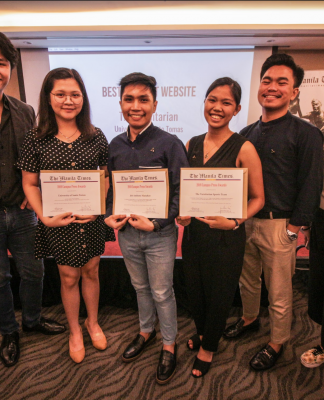To honor his contributions in the field of chemistry, the UST Graduate School presented a festschrift to Fortunato Sevilla III last Feb. 26 at the Faculty of Civil Law Auditorium.
A festschrift is a volume of writings by various authors presented as a tribute to a scholar.
“[It] is for distinguished member of the faculty [whose] scholarly achievements are beyond question and his contributions to the field are monumental,” Graduate School (GS) Dean Marilu Madrunio said in her speech during the presentation of the festschrift. “It is the highest recognition given to a master mentor.”
Madrunio stressed that a festschrift could only be given to an academic with prodigious intellect and indelible legacy.
“It cannot be given to just anyone,” she said. “We can count with our fingers who can be given this recognition.”
The festschrift given to Sevilla is a first in the field of sciences and only the second published by the University.
As a tribute to the scientist, GS published a special issue of Acta Manilana, the official journal of the Research Center for the Natural and Applied Sciences (RCNAS), which contains 33 scientific studies related to Sevilla’s field of expertise.
“We used Acta Manilana as the avenue for the festschrift publication,” said GS Lead for the Sciences Christina Binag.
The study was compiled from different contributors, friends, colleagues and mentees of Sevilla and includes a range of topics from chemical sensors and biosensors, chemistry education, microscale chemistry, low-cost instrumentation and analytical chemistry.
Sevilla graduated from UST in 1968 with a degree in Chemistry and obtained his master’s and doctoral degrees in Instrumentation and Analytical Science from the University of Manchester Institute of Science and Technology in the United Kingdom.
He was director of the Research Center for the Natural Sciences (before it was renamed RCNAS) in 1987 and held the position for 13 years and later on, he was appointed Assistant to the Rector for Research in Development before taking the deanship of the College of Science from 2002 to 2008.
An expert in instrumentation, Sevilla shared his knowledge by holding workshops in numerous schools around the country.
He also trained chemistry teachers on how to teach the subject inexpensively through low-cost instruments and micro-scale experiments.
Sevilla’s research mostly focuses on chemical sensors and biosensors which he pioneered in the Philippines.
“I am honored to receive this festschrift and it is proof of the heightened research culture in the University, which I hope will produce more festschrifts in the future,” Sevilla told the Varsitarian. Michael Carlo C. Rodolfo
















